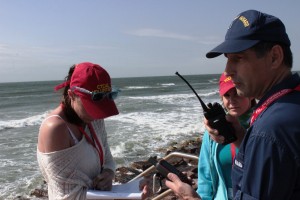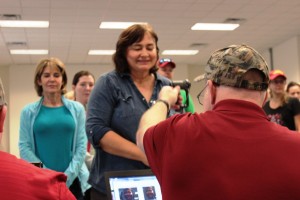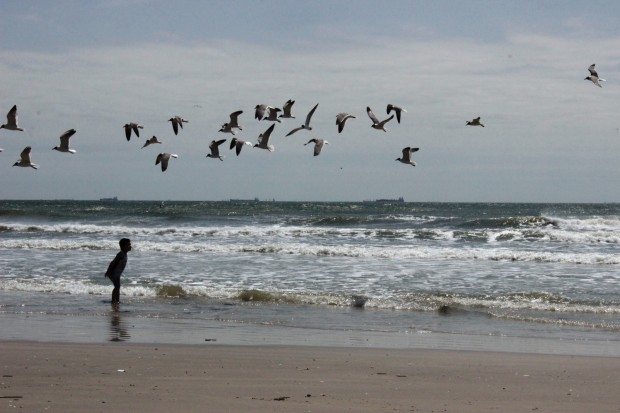How the Coast Guard is Managing Oil Spill Volunteers

Dave Fehling / StateImpact
US Coast Guard Lt. Dave Wood with volunteers on Galveston Island
Volunteers Warned Phones with Photos of Oiled Beaches Could Be Confiscated
When a barge carrying fuel oil collided with a ship last month off Galveston Island, hundreds of people began signing up to help. For days now, volunteers have been walking the beaches looking for oil slicks, tarballs, and injured wildlife. Their reports are helping officials pinpoint where to send clean-up crews.
One of the volunteers is Kelli Stoveken from Seabrook, a community 20 miles up the shoreline of Galveston Bay from where the barge collision happened last month.
“I grew up in this area. I worked summers on a shrimp boat in Clear Lake. I don’t want to see anything happen to it,” Stoveken said.
She was among a dozen volunteers who gathered early last Friday morning at the old Galveston County Courthouse. Under the coordination of the Galveston Bay Foundation and the U.S. Coast Guard, they were checked in, given photo IDs, and lectured on the do’s and don’ts of being a volunteer “sentinel.”
New Spill, New Policy

Dave Fehling / StateImpact
Volunteers line up to for photo IDs before being sent to beaches to look for spill damage
Four years ago during the far bigger Deepwater Horizon spill, there were complaints that volunteers were, in the words of U.S. Coast Guard Lt. Dave Wood, “shutdown.” They were turned away.
Now, there’s the new Sentinel program which Lt. Wood explained to the volunteers before they headed to the beach.
“The Sentinel program is one of the first programs of its kind to allow volunteers to go out and actually observe and report,” Lt. Wood said. “You will not be doing clean up. You will not be touching oil. You will not be doing tar balls.”
And Lt. Wood warned that they might not want to take photos with their smartphones of anything that might be considered “evidence” in litigation resulting from the spill.
“Just remember, lawyers are involved, and if you have evidentiary pictures and you’re taking evidence, you will lose that cellphone probably for the rest of your life,” said Lt. Wood.
StateImpact Texas checked with a lawyer who has filed oil spill lawsuits, Tony Buzbee. He said the idea that volunteers’ cellphones would be confiscated for a court case was “simply ridiculous.” In an email, Buzbee wrote: “I have never heard of anyone doing that.”
Finding Traces of Spill
Duly warned nonetheless, the volunteers boarded a van and were dropped off along the Galveston Seawall. Walking among surfers and kids playing in the sand, it wasn’t long before volunteers were on a two-way radio, relaying coordinates for what they’d found.
“We saw some tar balls, so we called them in just to have someone check them out,” said Sharon Hill, a volunteer from LaPorte.
Another volunteer was Marilyn DeMontrond from Houston.

Dave Fehling / StateImpact
Ships dot the horizon off Galveston Beach, waiting to enter the channel near where collision happened March 22
“I love coming to Galveston, I love looking at the birds, so I felt like I should help with the clean-up,” said DeMontrond.
But she found it can be heartbreaking work. Last week, volunteers found several dead dolphins. DeMontrond’s team found birds.
“I don’t like it when we find birds, but yesterday we found one oiled bird. And you know there are more. But hopefully, we do the best we can, and the wildlife response groups are cleaning the birds.”
DeMontrond’s family has a big car dealership in the area, so she knows all about the local economy. When asked about the benefit of having so much commerce and industry here on the Gulf versus the risk highlighted once again by this latest spill, she said balance is important.
“Yes, there is a risk, but yes, we employ lots of people, and we provide petroleum products for the country, and I think we’ve reached a point where we can balance the risk versus the benefits,” said DeMontrond.